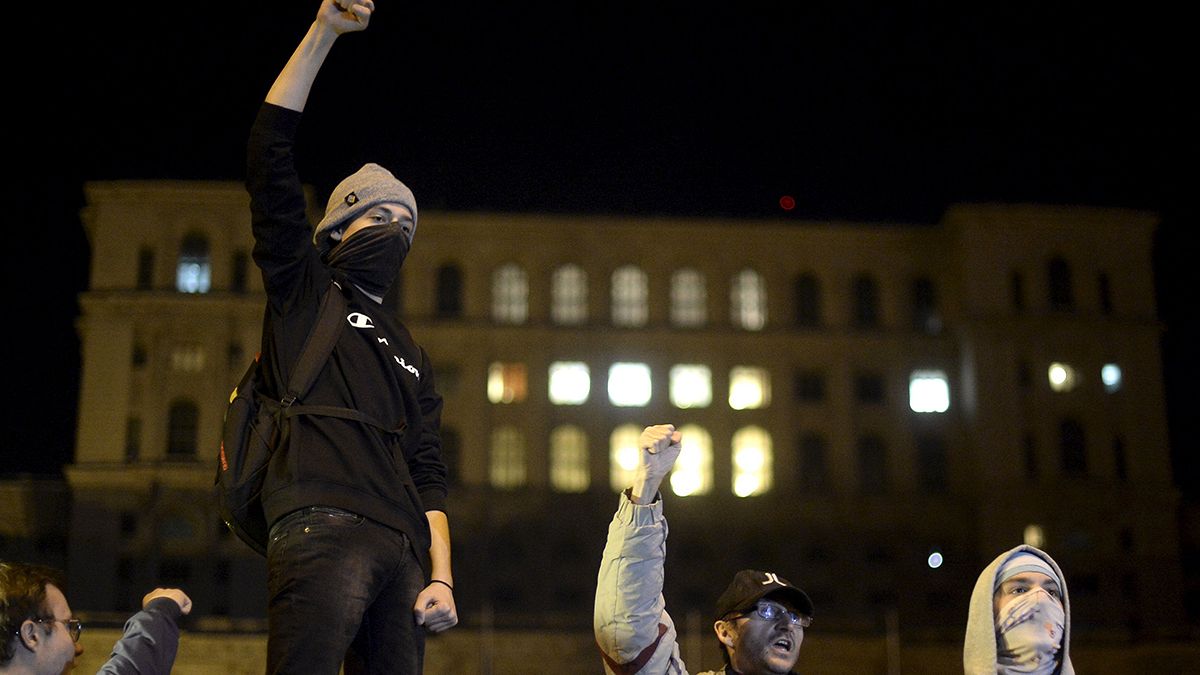‘Corruption kills’ and ‘Murderers’ Just two of the slogans chanted by Romanians who have taken to the streets in their tens of thousands to protest
‘Corruption kills’ and ‘Murderers’
Just two of the slogans chanted by Romanians who have taken to the streets in their tens of thousands to protest
after Friday’s deadly nightclub fire – one of their country’s worst disasters in decades.
A new interim prime minister has been brought in to try to contain the crisis. Outgoing Education Minister Sorin Campeanu replaces Victor Ponta who quit in the wake of the protests.
Facing trial for corruption, Ponta had ignored prior calls to step down after being indicted in September for forgery, money laundering and being an accessory to tax evasion during his time as a lawyer.
The fire broke out when fireworks were lit at a rock concert at the club in Bucharest. It left 32 people dead and nearly 200 more injured.
The tragedy caused grief and anger over the way licences are issued by a public administration widely seen as corrupt.
We talked to Luca Niculescu, editor in chief at Radio France International in Romania.
Sophie Desjardin, euronews: “Media headlines have been declaring that the nightclub tragedy brought down the government, but that’s not really what did it, is it?”
Luca Niculescu, editor-in-chief, RFI Romania: “No, it’s the last straw, so to speak. Tension had been building up for a long time, with a general anger over several outrages lately. What happened with Friday night’s tragedy symbolises a whole chain of incompetence and corruption, both locally and centrally, and so the people in Bucharest rebelled.”
“Why now, has something in society changed?”
Niculescu: “We can call it a new generation, people who are 25-35. They’re the ones who gathered in the streets. As a psychologist said, they are Romania’s gold mine, its brain power. They’re busy people who have a job and don’t want to leave Romania, who want to build their future here, unlike other generations, who chose to leave Romania — four million people in the last ten-twelve years. These people want to create a Romanian society and are ready to fight for it.”
“A few months ago, in spite of his legal entanglements, Victor Ponta refused to resign. He said democracy isn’t practised in the street. Yesterday he said, ‘I hope the resignation of the government will satisfy the people who were in the street.’ It’s been barely five months, what happened?”
Niculescu: “A lot more people took to the streets. There haven’t been this many in the streets of Bucharest since 1990, right after the fall of the communist regime. Yesterday in Bucharest there were 40,000 people, and 40,000 more in other cities also. Now, that might not be much for a country like France but for Romania those are very significant numbers, because Romanians don’t often do that. Faced with this groundswell of protest, he quit.”
“What can the president do, elected last year to general surprise on an anti-corruption platform. What are his options?”
Niculescu: “The president has to walk a fine line. He has to keep direct contact with the people protesting, on one hand, while on the other he mustn’t distance himself too much from the political class because the prime minister he’s going to name is also going to need the approval of parliament, which is dominated by the very political class that the people in the street are rejecting as a block. Therefore, the president has a very fragile balancing act to maintain, and this is the first time he’s faced this challenge. We’ll see how he makes out.”
“With elections, let’s remember that in 2012 the PSD social democrats won 58% of the votes. The centre-right got 16%. This means there isn’t an alternative to this class of politicians who the people want gone.”
Niculescu: “For the moment, no, because the same big parties dominate the political landscape, but there has been some headway, laws that have been changed, for example just a few months ago it was made possible to create a political party in Romania with only three members, just three individuals, when last year it had to be 20,000. Seeing the scope of protest, it is possible that will feed political energy and lead to more and more political parties. We might see new leaders emerge.”


